First look at how little Amherst’s police alternative being used called troubling
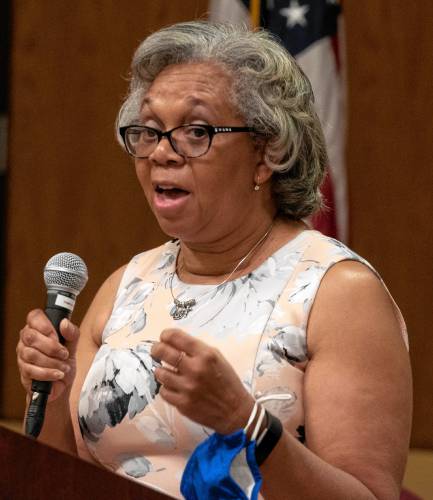
Pamela Nolan Young, the director of Amherst’s Department of Diversity, Equity and Inclusion, said the number of dispatch calls recorded as being routed to CRESS was probably inaccurate. STAFF FILE PHOTO
| Published: 04-17-2024 3:55 PM |
AMHERST — The tiny number of emergency dispatch calls directed to the Community Responders for Equity, Safety and Service since mid-December, when the department began taking 911 calls, is prompting worries by members of the Community Safety and Social Justice Committee about how the public safety department is being used.
Following a public records request for data, the committee that offers advice to town officials on advancing diversity, equity, inclusion, and community safety in Amherst contends that there were only a handful of dispatch calls going to CRESS over the 80 or so days from Dec. 18 through March 4, according to Committee Co-Chairwoman Allegra Clark.
“Three (dispatch calls) seemed very low to me, and it seemed kind of disappointing, honestly,” Clark said.
The CRESS department has eight paid full-time responders, a director, and implementation manager. The department receives approximately $641,000 in funding from the town, according to budget figures.
Diversity, Equity and Inclusion Director Pamela Nolan Young, who had been one of the interim leaders of CRESS until Camille Theriaque assumed leadership this month, told the committee at its April 10 meeting that although three dispatch calls seems low, the small number is likely not an accurate number of dispatch calls.
Clark agreed that clarification is needed on whether the data is accurate.
The committee received 88 pages of information about the work done by CRESS, beginning on Dec. 18, when dispatch calls could start being directed to the department, and concluding on March 4, when the public records request was made. When dispatch began, CRESS personnel were allowed to respond to six types of calls, based on the current computer-aided dispatching system: well-being checks, mental health calls, assisting businesses or agencies, assisting citizens, administrative work and follow-up.
Along with computer-aided dispatching reports, the data received by the committee includes internal information, such as call origin, whether dispatch, phone call, email or walk-in, or other; call types, such as well-being check, assisting other agencies and community engagement; and other information, such as the time of day, the day of week and the weather conditions.
Article continues after...
Yesterday's Most Read Articles
 Pro-Palestinian protesters set up encampment at UMass flagship, joining growing national movement
Pro-Palestinian protesters set up encampment at UMass flagship, joining growing national movement
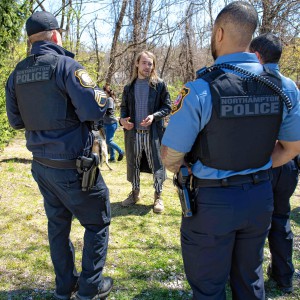 Homeless camp in Northampton ordered to disperse
Homeless camp in Northampton ordered to disperse
 Authorities ID victim in Greenfield slaying
Authorities ID victim in Greenfield slaying
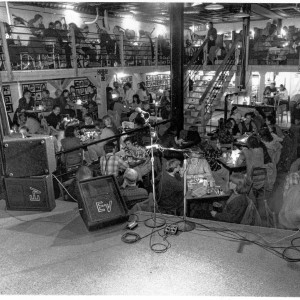 The Iron Horse rides again: The storied Northampton club will reopen at last, May 15
The Iron Horse rides again: The storied Northampton club will reopen at last, May 15
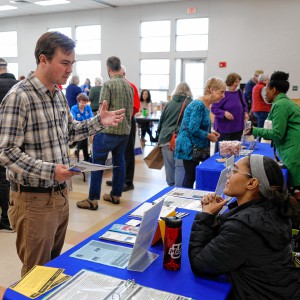 Filling the need: Volunteer Fair returns, giving those seeking to donate their time a chance to see what’s out there
Filling the need: Volunteer Fair returns, giving those seeking to donate their time a chance to see what’s out there
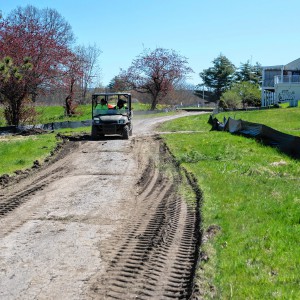 Amherst officials outline vision for Hickory Ridge: fire station, community center, affordable housing among options
Amherst officials outline vision for Hickory Ridge: fire station, community center, affordable housing among options
Debora Ferreira, the other co-chair of the Community Safety and Social Justice Committee, said the committee shouldn’t have had to resort to a public records request, but should have information provided as part of the committee’s responsibility to support the Town Council, town manager and others.
“Why can’t we just get the data without having to go through the rigmarole a public records request?” Ferreira asked
Ferreira said the public records request was only partially filled. Completing it would have cost more than $600, mainly for staff hours to compile the data.
Still, the records do show that in early January, one of the three dispatch calls was a highlighted interaction, with a homeless person sleeping on the Town Common. That information states:
“Upon arriving, responders noticed a neighbor walking away from a recently used sleeping bag at the far corner of the common. The neighbor noticed the responders standing near the sleeping bag and returned, and was identified as the one reported by dispatch and assured that responders were not there to remove their belongings. They are known by the responders, and were relieved that CRESS were the ones to check on him, due to the extreme cold. Responders explained that despite this neighbor being trespassed from Bangs Community Center, CRESS is still committed to serving and providing resources to them. They thanked responders and continued on their way.”
Ferreira said more data is needed, because the committee can’t be blind to how CRESS is being used. Moving forward, she wants assurances that this will be provided.
But Young said the data on CRESS activities kept by police is not complete and possibly inaccurate, and keeping records is still an ongoing challenge for CRESS.
Meanwhile, the use of the unarmed responders as lunch monitors at Amherst Regional Middle School is also raising red flags.
“Because of staffing issues at the school, there was a request to see if responders could provide some support to the schools, so they have been doing that on a regular basis,” Young said.
Ferreira said CRESS isn’t just for social services, but for responding to any nonviolent concerns, and that should be the focus, rather than lunch duty.
“That’s not the original mission-vision of CRESS,” Ferreira said.
Clark said she wonders if that work is detracting from other responsibilities, understanding there is an opportunity to build relationships and be a positive influence in the wider community.
“I wonder what things it might be taking CRESS away from in the community, and if that’s going to be an ongoing de facto strategy for staffing the schools, which I don’t think is the appropriate way to staff the schools,” Clark said.
Young said there is no evidence that this is depriving the department of other objectives. “It is not our No. 1 priority in the department,” Young said. “No other call has been neglected or gone unanswered because responders were there (at the school).”
The only reason they have time to be at the school, Ferreira said, is because noise complaints and other low-level responses are not yet handled by the eight CRESS responders, with dispatchers not allowed to direct those calls to them.
“They’re not at a capacity because they’re not being used at full potential,” Ferreira said.
Scott Merzbach can be reached at smerzbach@gazettenet.com.

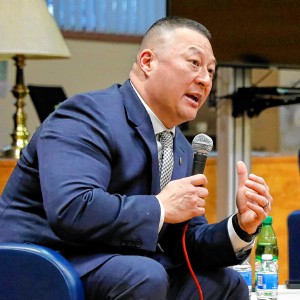 Amherst council confirms Gabriel Ting as police chief
Amherst council confirms Gabriel Ting as police chief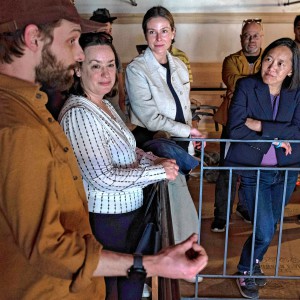 Music key to Northampton’s downtown revival: State’s top economic development leader tours city
Music key to Northampton’s downtown revival: State’s top economic development leader tours city  Island superintendent picked to lead Amherst-Pelham region schools
Island superintendent picked to lead Amherst-Pelham region schools State fines Southampton’s ex-water chief for accepting lodging and meals at ski resort, golf outing from vendor
State fines Southampton’s ex-water chief for accepting lodging and meals at ski resort, golf outing from vendor 
